Table of Contents
Remembering Irving Berlin, born on this day in 1888 (1888-1989).
Come join us now, and enjoy playing your beloved music and browse through great scores of every level and styles!
Can’t find the songbook you’re looking for? Please, email us at: sheetmusiclibrarypdf@gmail.com We’d like to help you!

Best Sheet Music download from our Library.
Irving Berlin: The Immortal Songwriter of America.
Irving Berlin (1888–1989) was one of the most prolific and influential songwriters in American history. Born in Russia as Israel Beilin, he immigrated to the United States as a child and rose from poverty to become a defining voice of 20th-century popular music. Over his seven-decade career, Berlin composed over 1,500 songs, many of which became timeless classics, including “White Christmas,” “God Bless America,” and “There’s No Business Like Show Business.” His music transcended genres, shaping Broadway, Hollywood, and American culture at large.
This article explores Berlin’s life, works, musical style, techniques, discography, filmography, influences, and enduring legacy.
Biography
Early Life (1888–1907)
Irving Berlin was born Israel Beilin on May 11, 1888, in Tyumen, Russia (though some sources cite Mogilev, now Belarus). His family fled Russian persecution of Jews in 1893, settling in New York City’s Lower East Side. His father, a cantor, died when Berlin was just eight, forcing him to work odd jobs, including as a street singer and newspaper boy.
With little formal education, Berlin taught himself piano in a unique way—playing only in the key of F-sharp major (using only the black keys) and relying on a transposing piano to adjust keys as needed.


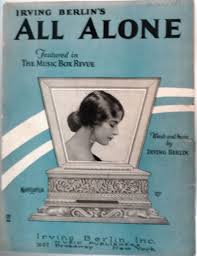
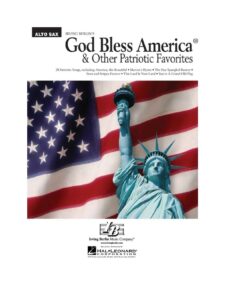
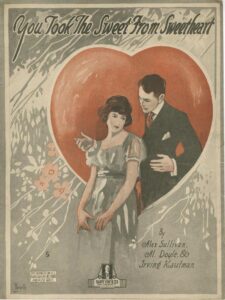



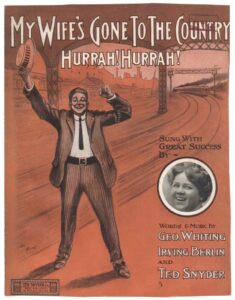
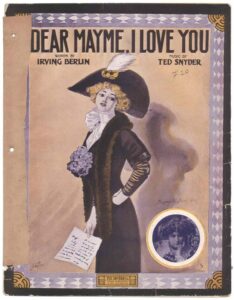
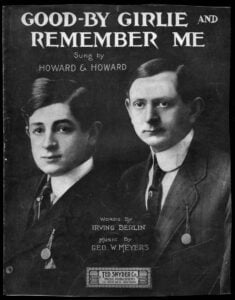
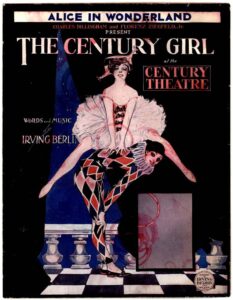
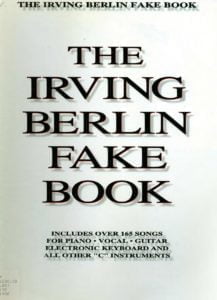
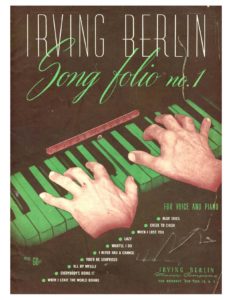
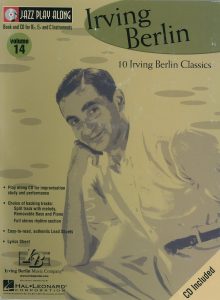
Browse in the Library:
Or browse in the categories menus & download the Library Catalog PDF:
Rise to Fame (1907–1920s)
Berlin began his career as a lyricist, contributing words to popular songs. His first major hit was “Alexander’s Ragtime Band” (1911), which became a national sensation and established him as a leading Tin Pan Alley songwriter.
Please, subscribe to our Sheet Music Library.
If you are already a subscriber, please, check our NEW SCORES’ page every month for new sheet music. THANK YOU!
In 1919, he founded his own music publishing company, Irving Berlin Inc., ensuring full control over his works—a rare move for composers at the time.
Broadway and Hollywood Success (1930s–1950s)
Berlin thrived in both Broadway and Hollywood, composing full scores for musicals such as:
- Annie Get Your Gun (1946) – featuring “There’s No Business Like Show Business”
- Call Me Madam (1950) – with “You’re Just in Love”
His film contributions included classics like:
- Top Hat (1935) – “Cheek to Cheek”
- Holiday Inn (1942) – “White Christmas” (the best-selling single of all time)
- Easter Parade (1948) – “Steppin’ Out with My Baby”
Later Years and Death (1960s–1989)
Though his output slowed after the 1950s, Berlin remained a revered figure. He lived a private life, rarely appearing in public after his last Broadway musical, Mr. President (1962). He died on September 22, 1989, at 101, leaving behind an unparalleled musical legacy.
Musical Style and Technique
Melodic Simplicity and Catchiness
Berlin’s genius lay in his ability to craft simple yet unforgettable melodies. Unlike many composers who relied on complex harmonic structures, Berlin’s tunes were instantly hummable, making them accessible to a broad audience.
Lyrical Craftsmanship
His lyrics were conversational, witty, and deeply emotional, often reflecting themes of love, patriotism, and nostalgia. Songs like “Always” (1925) and “How Deep Is the Ocean?” (1932) showcased his poetic yet straightforward style.
Harmonic Approach
Despite his limited formal training, Berlin had an intuitive grasp of harmony:
- He frequently used chromatic passing tones to add color to melodies.
- His chord progressions were elegant but uncomplicated, often sticking to diatonic harmonies with occasional modulations.
- He favored AABA song form, a standard in Tin Pan Alley and Broadway tunes.
Rhythmic Innovation
Berlin was a master of syncopation, influenced by ragtime and early jazz. Songs like “Puttin’ on the Ritz” (1929) demonstrated his rhythmic playfulness.
Notable Works
Songs
- “Alexander’s Ragtime Band” (1911)
- “Always” (1925)
- “Blue Skies” (1926)
- “Puttin’ on the Ritz” (1929)
- “How Deep Is the Ocean?” (1932)
- “God Bless America” (1938, revised 1939)
- “White Christmas” (1942)
- “There’s No Business Like Show Business” (1946)
Broadway Musicals
- The Cocoanuts (1925)
- Face the Music (1932)
- Annie Get Your Gun (1946)
- Call Me Madam (1950)
Film Scores
- Top Hat (1935)
- Follow the Fleet (1936)
- Holiday Inn (1942)
- Easter Parade (1948)
Discography and Filmography Highlights
Key Recordings
- Irving Berlin’s America (1950s compilations)
- Ella Fitzgerald Sings the Irving Berlin Songbook (1958)
- Frank Sinatra’s “Come Dance with Me!” (1959, featuring Berlin songs)
Major Films Featuring His Music
- The Jazz Singer (1927) – Early talkie with Berlin tunes
- Top Hat (1935) – Fred Astaire & Ginger Rogers classic
- Holiday Inn (1942) – Introduced “White Christmas”
- White Christmas (1954) – Film adaptation of his songs
- There’s No Business Like Show Business (1954) – Marilyn Monroe sings Berlin
Influences and Legacy
Influences
- Ragtime (Scott Joplin’s syncopations)
- Jewish liturgical music (his father’s cantorial singing)
- Tin Pan Alley (early 20th-century pop songwriting)
Legacy
- Cultural Impact: “God Bless America” became an unofficial national anthem; “White Christmas” remains the best-selling single ever.
- Broadway & Hollywood: His works set standards for musical theater and film scores.
- Awards & Honors:
- Academy Award for “White Christmas” (1943)
- Tony Award for “Call Me Madam” (1951)
- Congressional Gold Medal (1955)
- Grammy Lifetime Achievement Award (1968)
Quotes About Berlin
- George Gershwin: “Irving Berlin has no place in American music—he IS American music.”
- Jerome Kern: “Irving Berlin is American music.”
Irving Berlin’s music captured the essence of America—its optimism, romance, and resilience. From ragtime to Broadway, from wartime patriotism to holiday cheer, his songs remain ingrained in the national consciousness. Though he never learned to read music fluently, his innate talent for melody and lyric made him one of history’s greatest songwriters. As long as people celebrate Christmas, fall in love, or take pride in their country, Irving Berlin’s music will live on.
